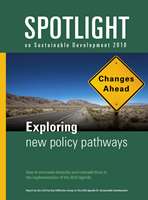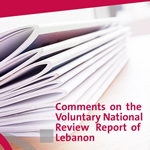Published on Fri, 2018-09-14 11:32
Austerity is a major concern in the report of Brazil. After over a decade of meaningful progress in tackling poverty through public investments in health, education and social protection, constitutional amendment 95/2016 (CA 95), known as the “Expenditure Rule”, came into force in 2017, freezing real public spending for 20 years. “By constitutionalizing austerity in this way”, comments the report by INESC, “any future elected governments will be prevented from democratically determining the size of human rights and basic needs investments.” Rule CA 95 has already begun to “disproportionately affect disadvantaged groups” as “significant resources are diverted from social programmes towards debt service payments”. These fiscal decisions “put at risk the basic social and economic rights of millions of Brazilians, including the rights to food, health and education, the implementation of the SDGs, while exacerbating gender, racial and economic inequalities”. |
Published on Thu, 2018-09-13 20:03
In Benin the Social Watch-Benin network set up four working groups (social, economic, environmental and governance) to draft a parallel report to the government's Voluntary National Review which reviewed 33 priority targets selected from each of the six SDGs to be reviewed at the HLPF in 2018. Indicators were available for only six of these. The network concludes that while the SDGs “have been incorporated in the government's Programme of Action and the projects initiated by the development cooperation partners” the lack of “an efficient information system able to illustrate about implementation” risks resulting in “bitter observations, as has happened with other international commitments and conventions”. |
Published on Wed, 2018-09-12 14:06
Bold Alternatives to Business as Usual “The world is off-track in terms of achieving sustainable development and fundamental policy changes are necessary to unleash the transformative potential of the SDGs.” This is the main message of the Spotlight Report 2018. |
Published on Wed, 2018-08-29 13:48
Lebanon participated in the Voluntary National Review (VNR) at the High Level Political Forum (HLPF) 2018, presented its progress report towards achieving sustainable development, and had its Q&A session on July 18th, 2018, at the UN Headquarters in New York. These comments, drafted by a group of civil society organizations, are intended as a contribution to the dialogue on the harmony between Lebanon’s international commitments to international institutions and donors, on one hand, and the achievement of SDGs, social justice, and equality, on the other. |
Published on Sun, 2018-08-26 00:00
The UN Committee for Development Policy has announced Bangladesh’s eligibility for graduation from Least Developed Country to Developing Country. This success also brings confidence for achieving the SDGs. In the last 15 years, with limited resources, Bangladesh has witnessed one of the fastest reductions in poverty anywhere in the world. The country has met the target in reducing the proportion of population below the national poverty line (currently 22.4%) three years ahead of time. It has reached the targets in reducing infant mortality rate from 92 per 1000 live births in 1990 to 46 now; and in decreasing the prevalence of underweight children less than five years of age from 66 percent in 1990 to 32.6 percent at present. In terms of education, the country has achieved nearly 100 percent enrollment in primary schools; and attained gender parity with more girls than boys in primary and secondary schools. |
SUSCRIBE TO OUR NEWSLETTER






